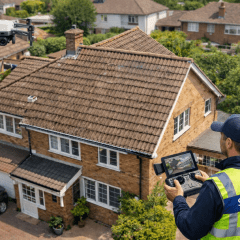If you’re buying a property, chances are you’ve come across the terms “survey” and “valuation”, if you’re feeling unsure about the difference, you’re not alone. Many homebuyers assume they’re the same thing, but they serve very different purposes.
Understanding the difference between a survey and a valuation can help you make a smarter, safer purchase and potentially save you thousands in unexpected repair costs.
What Is a Valuation?
A valuation is a brief inspection of the property, carried out for the benefit of your mortgage lender. Its purpose is simple: to confirm that the property is worth what you’ve agreed to pay for it.
A mortgage valuation will:
- Look at the property’s location, size, and basic condition
- Compare it with similar properties recently sold in the area
- Give the lender confidence that the property is suitable security for the loan
But here’s the key point:
A valuation is not a survey. It won’t tell you if there’s damp, roof damage, structural movement, or any of the hidden issues that could cost you later on.
In fact, most valuations only last around 15–30 minutes, and you may not even see a copy of the report.
What Is a Property Survey?
A survey, on the other hand, is a detailed inspection carried out by an independent RICS-qualified surveyor, working in your best interest not the lender’s.
There are several levels of survey available, but the most common are:
Level 2: Homebuyer Survey
- Suitable for most modern, conventional properties in reasonable condition
- Identifies visible defects and potential issues (like damp, cracks, insulation problems)
- Includes a clear report with a traffic light rating system
- May include a valuation and reinstatement cost (if requested)
Level 3: Building Survey
- Recommended for older, larger, or altered properties
- Much more in-depth, covering construction methods, defects, and repair advice
- No valuation by default, it’s focused entirely on the building’s condition
Why Does the Difference Matter?
It matters because a valuation alone won’t protect you from nasty surprises.
Here’s why a survey is essential:
1. You’ll Uncover Hidden Problems
Valuations don’t check for structural issues, damp, roof condition, or faulty wiring. A survey can flag these before you buy.
2. You Can Renegotiate the Price
If the survey reveals costly repairs, you may be able to negotiate a lower purchase price or ask the seller to fix the issues.
3. You Get Expert, Independent Advice
Your surveyor works for you, not the bank. That means honest, impartial feedback to help you make an informed decision.
Real Example
We recently surveyed a 1930s property in Dartford where the mortgage valuation showed “no concerns.” But our Level 2 Homebuyer Survey revealed:
- Damp penetration in several rooms
- A leaking flat roof to extension
- Multiple areas of cracked/blown rendering leaving the house open to water ingress issues
So, Do You Need Both?
In most cases, yes. The lender requires a valuation, and you should arrange your own survey to safeguard your interests.
Think of it like this:
Valuation
- For the lender
- Basic, short inspection
- Checks value only
- Doesn’t highlight risks
Survey
- For you
- Detailed property condition
- Checks for defects/damage
- Highlights problems + advice
Final Thoughts
Don’t confuse a valuation with a full survey. If you want to avoid nasty surprises, protect your investment, and buy with confidence, a survey is worth it.
At London & Kent Surveyors, we offer clear, independent advice tailored to the type and age of your property and we’re always happy to explain your options.
Thinking of buying a home?
Let us help you make the right move. Get in touch today to book your survey or ask us anything.

